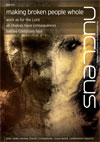new GMC guidance
The updated 2013 version of Good Medical Practice (GMP) was published on 25 March. GMP defines the standards against which doctors in the UK are judged in fitness to practise cases, and is therefore a very important document. The guidance is also used as the basis for doctors' appraisal and revalidation. Although GMP is not directly binding on UK medical students, the 'professionalism' strands in many undergraduate curricula assess students against very similar criteria to those in GMP.
As well as the main document, there are a number of pieces of 'explanatory guidance', setting out how the main principles of GMP work in practice. These include Delegation and Referral and Maintaining Boundaries.
Two pieces of explanatory guidance are likely to be of particular interest to Nucleus readers; Personal Beliefs and Medical Practice and Doctors' Use of Social Media.
Doctors' Use of Social Media is an entirely new document. The possible blurring of boundaries between private and professional life, particularly online, is considered. The main messages are that real names should be used for any interactions that identify the user as a doctor, and a reminder that social media sites do not offer a guarantee of confidentiality, whatever privacy settings are in place.
Personal Beliefs and Medical Practice revises old guidance. The final version thankfully omits a number of items in a previously published draft that could have significantly restricted the freedom of doctors who wish to discuss faith with patients. Recognition that 'personal beliefs and cultural values are central to the lives of doctors and patients' is welcome, as is the guidance that spiritual factors should be taken into account when assessing a patient. One line states: 'You may talk about your own personal beliefs only if a patient asks you directly about them, or indicates they would welcome such a discussion'. Hopefully this should not cause problems for doctors who are sensitive in raising matters of faith, though it may lead to complaints if a patient feels that a doctor has misread when such a discussion would be appropriate.
Conscientious objection is also covered, with a general (if rather vague) right of conscientious objection defined. However a number of exceptions may cause difficulties to at least some Christian doctors.
Ultimately the impact of the new guidelines will only be apparent when they are tested in Fitness to Practise hearings; until then it is important for UK doctors and medical students to become familiar with them, and consider any areas of conflict.
Christian counselling network launch
February saw the launch of a Christian counselling network in the UK. Nearly two thousand people attended the 'Changing Hearts' conference at Westminster Central Hall, organised by Christian Counselling Education Foundation (CCEF).
What is Christian counselling and why do we need it in the UK? CCEF aims 'to restore Christ to counselling and counselling to the Church'. Counselling means giving advice, and is used heavily in the church for personal issues ('pastoral care') and in secular health services for mental health problems ('psychological/talking therapies'). We might expect Christ to be central to pastoral care in the church, but perhaps not in secular practice. Why the difference?
The medical model teaches us that diseases arise from causes, and so we should identify and treat the cause to resolve the disease. In psychiatry, the teaching is that there are biological, psychological and social causes to mental health problems. But there is a fourth potential cause: spiritual.
When treating patients with depression, for example, we should make no assumption about the cause. There may be a biological cause, there may be a spiritual cause. Christians should not over-spiritualise everything, but we are often taught to de-spiritualise mental health issues. As good doctors, we should take a balanced approach, identifying the true cause and offering the appropriate treatment. A Christian approach to counselling means we must recognise that, in some situations, Christ will be the only solution.
www.ccef.org
bid to publish abortion statistics
Fiona Bruce MP used the House of Commons' 'ten minute rule' to highlight concerns over gender selective abortion. Nationally, 105 boys are born for every 100 girls in the UK. However among those of certain nationalities, the number of boys born rises, up to 108 for every 100 girls. Ministers have said that more research is needed to determine whether this is simply due to natural variations.
Mrs Bruce said 'It is a tragedy that in some countries the words “it's a girl” are not always a source of joy but of danger; the illegal abortion of baby girls and the resultant imbalance in the number of young men and women in certain parts of these countries is surely something which no one in this country can condone.'
'The most dangerous place for a girl should not be in her mother's womb. After all the endeavours on the part of successive governments to outlaw and end discrimination, the fact that a baby could be aborted just because she is a girl (or, indeed, a boy) remains the most basic form of discrimination, and concerns about it cross communities, cultures and countries. We need to be willing to open up a dialogue about this in the UK and to ensure that that dialogue is properly evidence-based – hence the call for the Department of Health to take action.'
Investigations by the Daily Telegraph and others in 2012 had suggested that some doctors were signing papers for abortions clearly based on the gender of the baby. A Care Quality Commission investigation later in 2012 had found 'irregularities' at 14 NHS trusts, largely around signing of the forms authorising abortions.
Telegraph.co.uk 16 April 2013
































